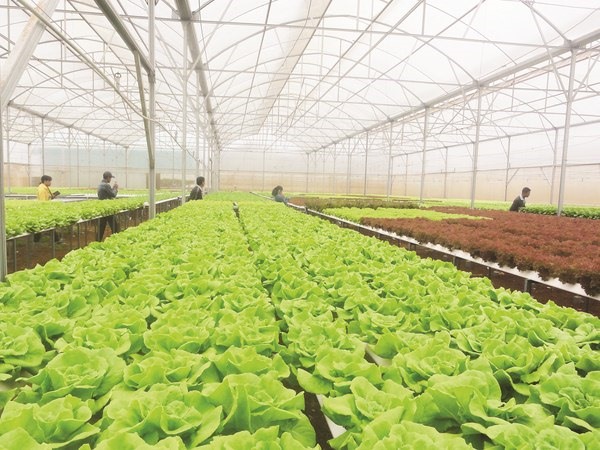.jfif) Opinion
Opinion

Đinh Trọng Thắng, director of the Department of Investment, under the Research Institute of the Central Economic Management – Ministry of Planning and Investment talks to the newspaper Hải Quan (Customs) on what the country should do to attract enterprises to invest in agriculture.
 |
| A farm of VinEco Vĩnh Phúc. — Photo baohaiquan.vn |
Đinh Trọng Thắng, director of the Department of Investment, under the Central Institute of Economic Management – Ministry of Planning and Investment talks to the newspaper Hải Quan (Customs) on what the country should do to attract enterprises to invest in agriculture.
Do you know why only a few Vietnamese enterprises have invested in agriculture?
There are various reasons, but in my opinion, the most challenging reason facing the enterprises is their difficulties in approaching production resources like land and labour force in rural areas as well as market resources.
However, in my opinion, the biggest issue that should be settled now is farmers’ income and the acreage put under rice. In other words, we need a new approach to ensure food security and avoid the idea thinking that food security must go hand in hand with the productivity and the land acreage reserved for a certain crops.
In my opinion, this is a pre-requisite to further promote our current reform of the economic market in our country’s primary industry and rural area. At the same time, it will also help us to address challenges in acquiring land, labour force and capital agriculture production.
Another important reason we cannot forget to mention is the issue of norms and standards in our country. For example, prices of farm products using the VietGap standards are not much different from non-VietGap standards. This is a question we need to address right now for the health of the consumers and the benefits of farmers who have spent a lot of money and time to produce healthy food to consumers.
Many investors in the agriculture sector have lamented about what is written in the Government policies and their implementation in life. How do you respond to their complaints?
To encourage enterprises to invest in agriculture and rural development, the Government has issued the Decree 210/2013 on agriculture policy to encourage enterprises to invest in agriculture development. However, that Decree was promulgated before the issuance of the Land Law, Public Investment Law, Investment Law and Law on Construction. As a result, quite a few provisions in these laws are overlapping, making their implementation difficult.
This has become hindrances for enterprises wanting to invest in agriculture. To solve this problem, the government has recently revised the Decree 210/2013 to facilitate conditions for enterprises to invest in the country primary industry.
However, what the enterprises need is the Government’s policy on land acquisition so they can have large field to cultivate rice and use mechanisation in production.
In my opinion, to solve this problem, the Government needs to adopt a new Resolution on orientation and solution to attract more enterprises to invest in the agriculture industry and consider it a Government’s priority in the course of restructuring the agriculture economy and rural area in the near future.
In the last few years many big Vietnamese enterprises, like VinGroup, FLC, T&T, TH True Milk, Hòa Phát, Thaco Trường Hải and others have expanded their investment in the agriculture sector. What do you think about the phenomena?
It is a good sign. When big enterprises decide to invest in agriculture, no doubt, they have adopted strategies and clear objectives before making their decisions.
Furthermore, they have also seen potentials for development and benefits in their investment. I’m confident these big enterprises will act as locomotives and work side by sides with other enterprises to create closed ecological systems (CES) to produce safe products to consumers with fair prices. This is a good sign.
However, both the central and local governments should provide favourable conditions for small and medium enterprises to participate. At present, small and medium enterprises in Việt Nam account for more than 90 per cent of the country’s enterprises.
Many people think it is time for Việt Nam to create a market on land usage rights to improve the land and motivate enterprises to invest in agriculture development. What do you think?
In my opinion, it is an imperative need for Việt Nam to evaluate its policy through the lens of socio-economic efficiency. For example, at present, a farmer in the Mekong Delta earns VNĐ5-6 million (US$220-260) per 1,000sq.m in a rice crop. If they switch to grow dragon fruit or orange, they would earn VNĐ50-60 million ($2,200-2,600) per a crop.
But in reality, to turn rice cultivated land into orchards or other crops, it is not easy at all. This is something the Government should think about and allow farmers or enterprises to transfer their land use rights, including agricultural land and to lift the land cap policy and to abolish the policy on land use limitations. — VNS




